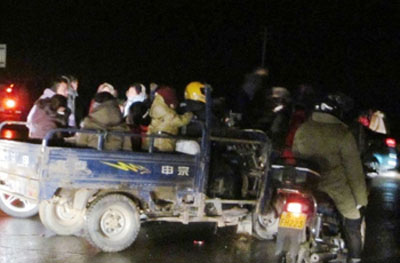Panic is deadlier than killer bananas
- By Alexandre Lesto
 0 Comment(s)
0 Comment(s) Print
Print E-mail
China.org.cn, February 15, 2011
E-mail
China.org.cn, February 15, 2011
Imagine for a second I told you bananas could give you SARS – what would you do?
Chances are, you'd shake your head in amused skepticism and continue munching on your banana. Now imagine you suddenly received word from dozens of people, some of which you knew, denouncing in utter panic what you thought was a potassium-filled fruit is actually a SARS-packed killer banana.
This event occurred in 2007 in China, as millions of text messages claiming the fruit were infected with the virus spread like wildfire, leading to a total collapse of the Chinese banana market in Hainan, prices plummeting by 90 percent and growers going out of business.
Such is the power of the rumor, observable in a sad, yet similar display of its erratic, chaotic force last Thursday in Jiangsu Province, as word went out concerning an impending chemical factory explosion. The panic that ensued led to over 10,000 residents of four townships in Xiangshui County rushing to the streets in a maelstrom of traffic jams and stampeding crowds, claiming at least four lives.
 |
|
Local residents were on tracks and motorbikes, fled in terror on Feb.10, 2011 in Xiangshui County, Jiangsu Province. [JSCHINA.COM.CN] |
The occurrence has raised safety concerns, both in terms of measures taken to ensure secure conditions within factories but also proper response strategies being adopted by local authorities to reassure populations. The key to avoiding repeats remains elusive, yet evidently goes through an understanding of the nature of the rumor as a social phenomenon.
The danger of the rumor lies in that it grows in proportion and impact with each second it remains unchallenged. Studies go back hundreds of years, and one of the conclusions reached by William Stern in 1902 was that as a rumor is passed on, it not only gets more succinct but also becomes altered, with a message often more dramatic in content.
From a government standpoint, responding to a rumor is a thorny matter. Remaining quiet would allow the rumor to ferment, and could possibly serve to exacerbate its dimension if people believe it to be a signal of its silent affirmation. On the other hand, confirming a rumor, especially one catastrophic in nature, would only aggravate the level of panic.
Though there are no easy answers, there has been one important factor accounting for the recent surge in rumor dissemination: the cell phone. The killer banana rumor was spread thanks to millions of texts messages. In 2008, following the Sichuan earthquakes, one of my friends in Xi'an was warned by text message of an impending earthquake that was about to devastate the city. Chaos ensued in his university, where hundreds of students rushed to safety and called their loved ones despairingly. No earthquake was ever reported.
The cell phone has become the new rumor-tool in an age where the government's responsibility lies as much in warning and protecting its population from disasters, as it does in dispelling the irrational and ensuring dancing shadows don't allow for the summoning of tangible evils. How they choose to incorporate that into their strategy to avoiding events like those in Jiangsu from occurring again is up to them. The key, after all, lies not in supervising rumors, but in knowing whether a response will quell the contagion or diffuse it.
The authoris a French-American, currently living and working in Beijing.
Opinion articles reflect the views of their authors, not necessarily those of China.org.cn






Go to Forum >>0 Comment(s)